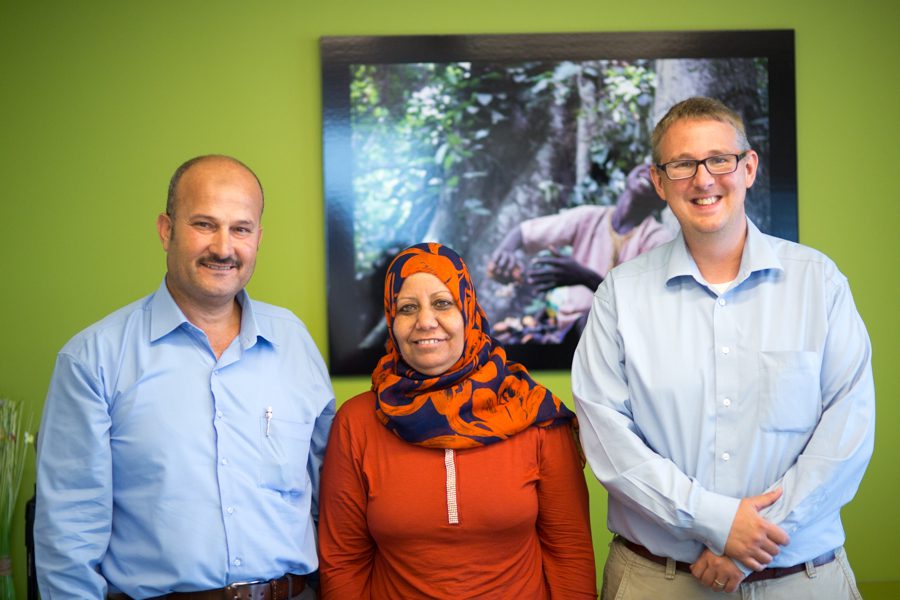By Shalom Khokhar
Foods Resource Bank (FRB), Mennonite Central Committee (MCC) and Al Najd Development Forum have joined forces to provide families in the Gaza Strip with long-term solutions to hunger and poverty.
Meeting ordinary, daily needs in the region is a challenge. Strict checkpoints control the movement of both people and supplies into and out of the Palestinian Territories. As a result, 58 percent of people in Gaza are food – insecure, and 90 percent of the water is unsafe to drink. Also, more than a million people live with limited water resources and sanitation, and 80 percent have electricity for only about four hours a day.
Al Najd is a humanitarian organization, which is based and operates in the Gaza Strip, and a MCC affiliate. Rifqa Hamalawi, Al Najd’s chair, and Dr. Rafat Hassouna, the organization’s program director, recently visited Bread for the World’s Washington, D.C., office. The purpose of the visit was to explain how the various programs established in partnership with FRB and MCC are helping the people of Gaza.
Rabbits play a central role in the main food program Al Najd developed. Families are given one male and four female rabbits. Rabbits can provide families with a large amount of food since breeding yields 200 to 250 offspring a month.
Why rabbits? They are easy to raise, can sell at a profit, and nutritionally have triple the protein of chicken and beef. Seventy-five families are currently involved with the program. Al Najd also offers classes in marketing, networking, and exchanging goods to women who want to educate themselves further on how to run a business.
Al Najd also works to rebuild war-torn homes in Gaza. Explosions have ripped off the roof and doors of houses and shattered windows. Attacks last year in the region left nearly every home damaged.
Al Najd trains volunteers to hang drywall and do electrical and plumbing work, among other things. The need for rebuilding is great. The organization chooses to rebuild the homes of those most in need.
The constant violence in the Gaza Strip is a growing problem in terms of personal safety and food security for residents. Since 2014, most of the land left is contaminated and unfit for growing crops. Various organizations are working on rehabilitating the land to produce native foods like potatoes, tomatoes, cucumbers, and olives. Explosions in the area have also caused the rabbit units to suffer from brain hemorrhages and 240 rabbits have perished as a result.
U.S. foreign aid is crucial to rehabilitating Gaza, said Eric Matson, an FRB representative. However, misconceptions and controversies surrounding the Gaza Strip and its people sometimes make receiving aid difficult.
Hamalawi said, “eighty percent of people in Gaza are liberal; they are not Hamas, they are not radical Muslims. They are looking forward to peace, to live as human beings, and we at Al Najd work hard for that.”
“Please, continue supporting advocacy, continue raising your voice. Our voice is not heard; we’ve tried. Most of the international community, those who are looking forward to peace, those who are looking forward for justice, raise their voice,” Hassouna said.
Shalom Khokhar is a summer communications intern at Bread for the World.
Photo: From left to right, Dr. Rafat M. Hassouna, Rifqa Y. Hamalawi, and Eric Madson. Joseph Molieri/Bread for the World.



